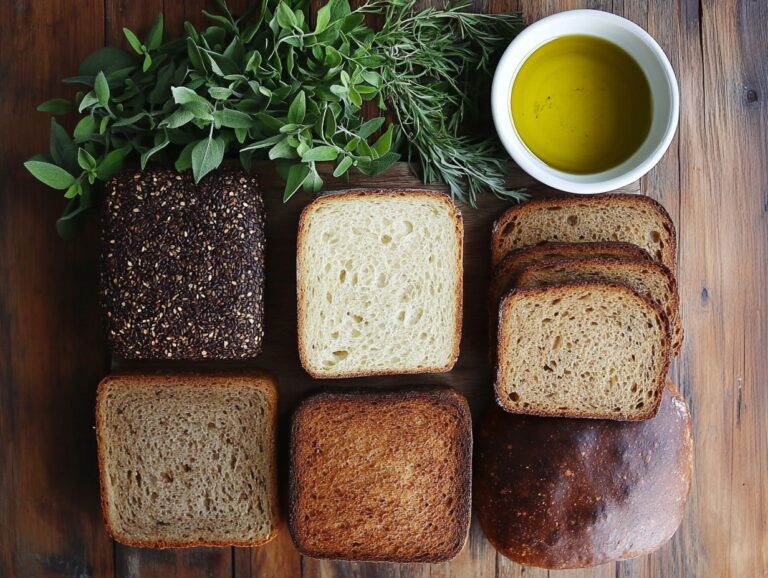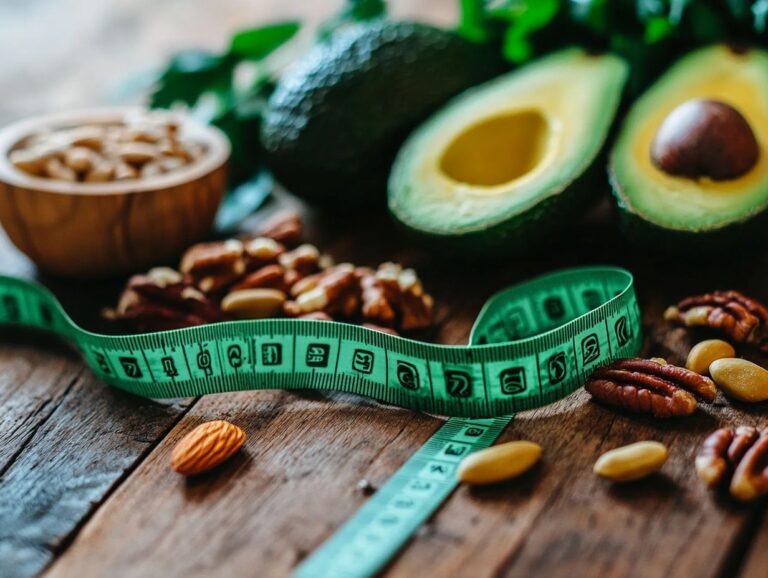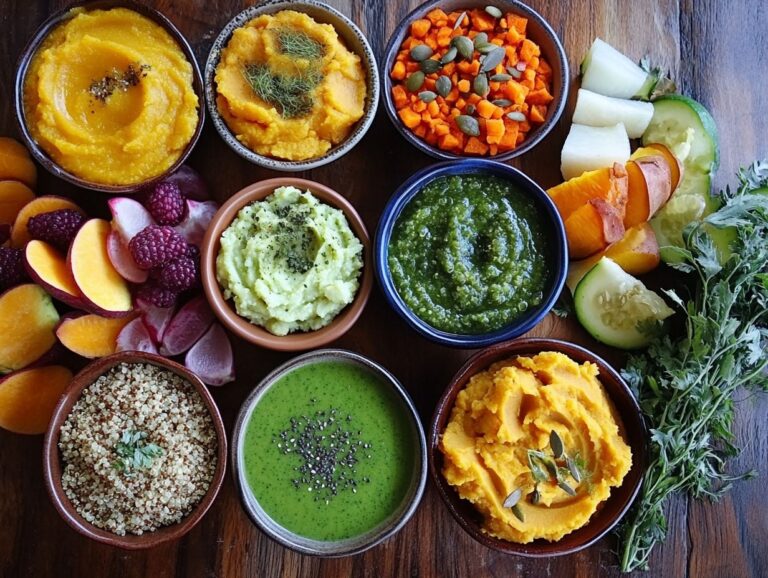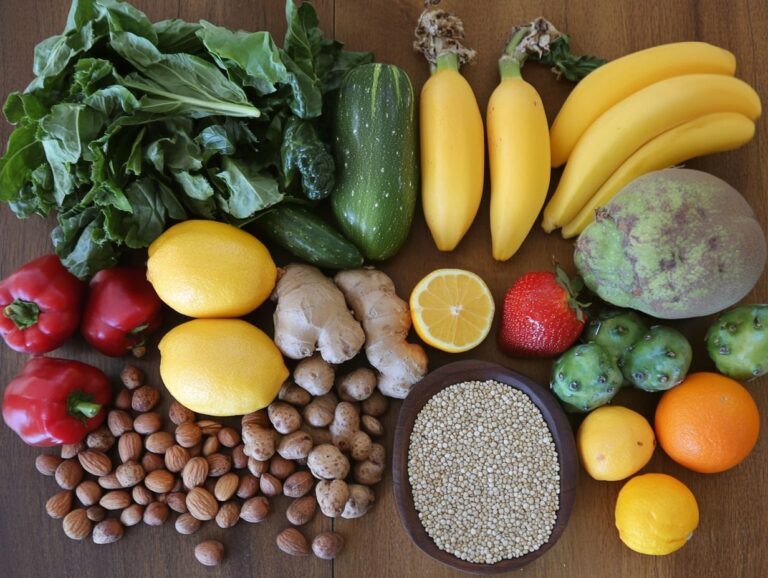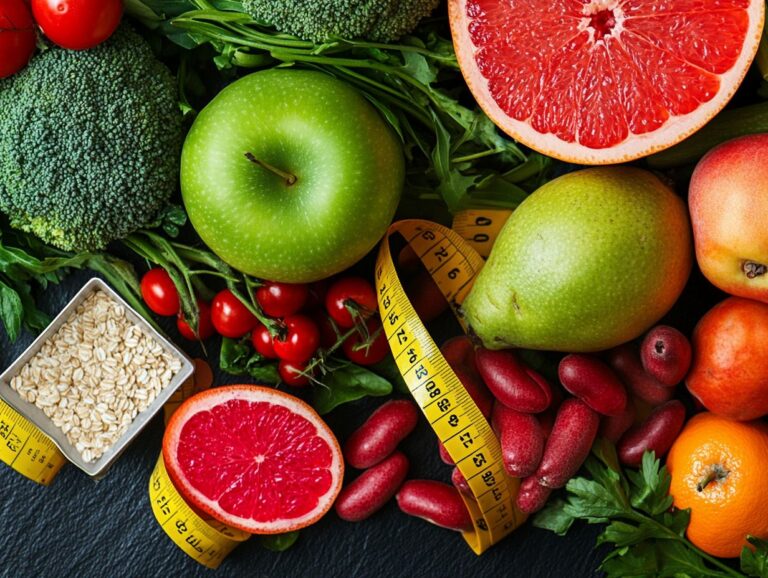In this guide, you will explore how a vegan anti-inflammatory diet functions, discover its benefits, identify which foods to include and avoid, and receive helpful tips for successfully following the diet.
Key Takeaways:
- A vegan anti-inflammatory diet can reduce inflammation in the body, help with weight loss, improve heart health, and boost the immune system.
- Key components of a vegan anti-inflammatory diet include fruits and vegetables, whole grains, nuts and seeds, and plant-based proteins.
- Avoiding processed foods, refined sugars, saturated and trans fats, and dairy products is important for a vegan anti-inflammatory diet.
What Is a Vegan Anti-Inflammatory Diet?
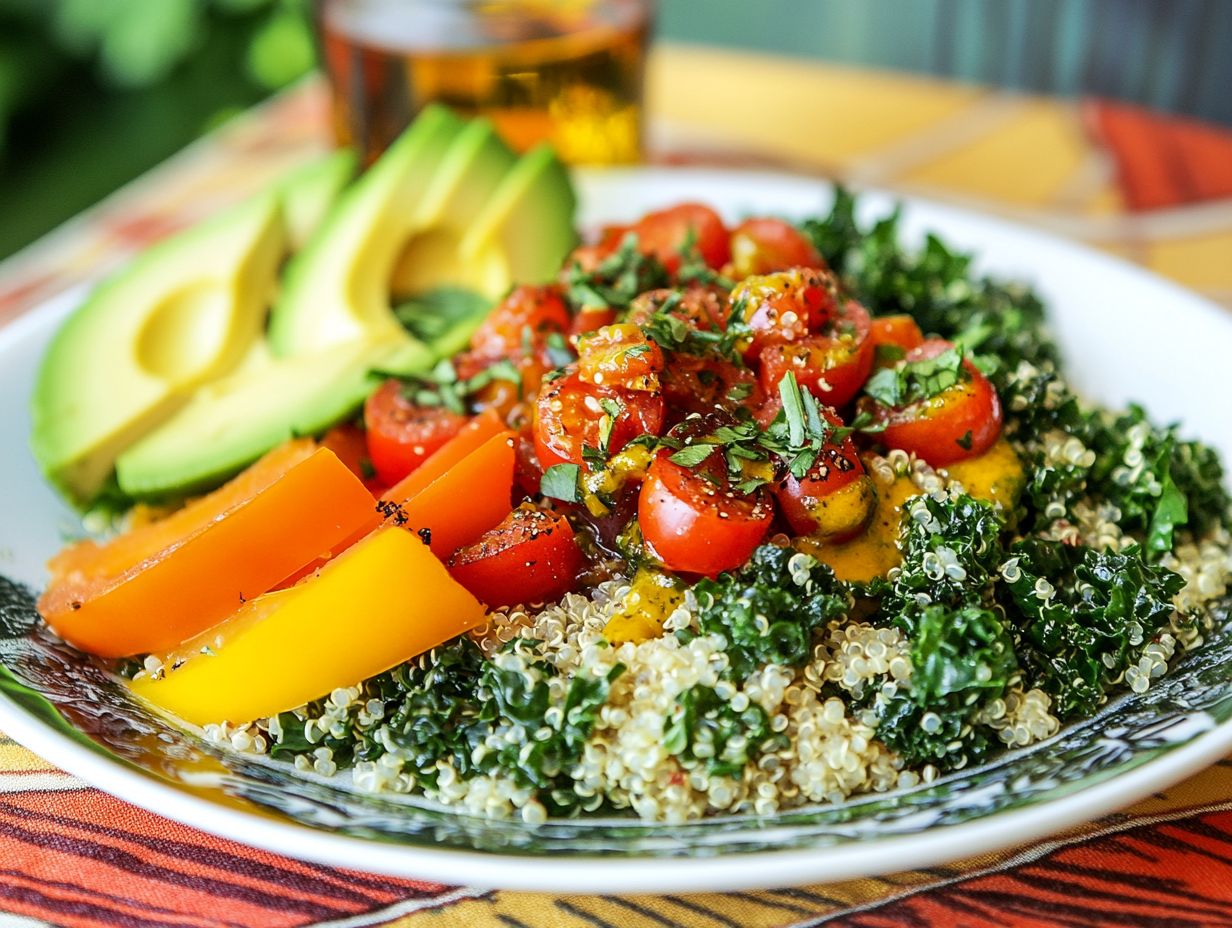
A vegan anti-inflammatory diet focuses on whole, plant-based foods and aims to reduce inflammation levels in the body, which is crucial for minimizing chronic inflammation and enhancing overall health.
This diet emphasizes the consumption of fruits, vegetables, whole grains, legumes, and healthy fats, all of which possess anti-inflammatory properties that can help reduce inflammation levels, mitigate the inflammatory response, and promote tissue repair.
By making informed dietary choices, individuals can optimize their nutrient intake and enhance their immune system function, leading to improved health outcomes and better management of inflammation symptoms.
What Are the Benefits of a Vegan Anti-Inflammatory Diet?
This plant-based diet is designed to address both acute and chronic inflammation.
A vegan anti-inflammatory diet offers numerous health benefits for individuals seeking to reduce inflammation. These benefits include a greater reduction in inflammation markers, enhanced immune system function, and protective effects against chronic diseases such as cardiovascular disease, metabolic syndrome, diabetes, and certain autoimmune conditions.
These positive health outcomes arise from following a diet rich in plant proteins, antioxidants, and omega-3 fatty acids, all of which have been shown to significantly improve cardiovascular health, reduce oxidative stress, and promote healthy weight loss.
1. Reduces Inflammation in the Body
The primary benefit of a vegan anti-inflammatory diet is its ability to reduce inflammation in the body, which is essential for overall health and the prevention of chronic diseases.
Incorporating foods with anti-inflammatory properties, such as fresh fruits and vegetables, legumes, and healthy fats, enables individuals to regulate their inflammatory response, leading to improved health outcomes.
Elevated levels of inflammation markers, such as C-reactive protein, are associated with a higher risk of heart disease, diabetes, and various other illnesses. Foods rich in omega-3 fatty acids, like flaxseeds and walnuts, are vital in a vegan anti-inflammatory diet, as they directly combat inflammation.
Meals that include a diverse array of colorful fruits—such as berries and oranges for their antioxidant content—along with leafy greens and whole grains, can effectively combat inflammation. Additionally, incorporating spices like turmeric and ginger not only enhances flavor but also provides beneficial anti-inflammatory compounds.
2. May Help with Weight Loss
A vegan anti-inflammatory diet can assist individuals in losing weight by promoting the consumption of foods that are low in calories yet high in essential nutrients and dietary fiber. This approach not only supports a healthy weight but also ensures that the body receives the necessary nutrients for overall well-being.
Foods such as whole grains, fruits, vegetables, legumes, and nuts, which are rich in dietary fiber, contribute to feelings of fullness and satiety. Consequently, those who adhere to this eating plan are likely to feel satisfied for longer periods. A reduced sense of hunger can significantly decrease the likelihood of unnecessary snacking or succumbing to cravings.
Meal planning is another effective strategy for weight loss; by preparing balanced meals in advance, individuals can incorporate a variety of anti-inflammatory ingredients that are both enjoyable to eat and beneficial for their health. Additionally, choosing colorful, plant-based meals that are rich in antioxidants can greatly enhance the effectiveness of this dietary approach.
3. Improves Heart Health
A vegan anti-inflammatory diet significantly benefits heart health by reducing all risk factors for chronic diseases, particularly cardiovascular health.
This diet is rich in healthy fats from sources such as nuts, seeds, and avocados, as well as plant-based omega-3 fatty acids, which are advantageous for heart health. Emphasizing whole, plant-based foods that are high in antioxidants and dietary fiber helps lower levels of C-reactive protein, a key marker of inflammation in the body.
Including fruits, such as berries, and vegetables, like leafy greens, contributes to nutrient intake, lowers blood pressure, and improves circulation.
To incorporate heart-healthy options into everyday meals, consider substituting refined grains with whole grains, such as quinoa and brown rice, and preparing colorful salads with a variety of vegetables, topped with a sprinkle of flaxseed for an added source of omega-3 fatty acids.
4. Boosts Immune System
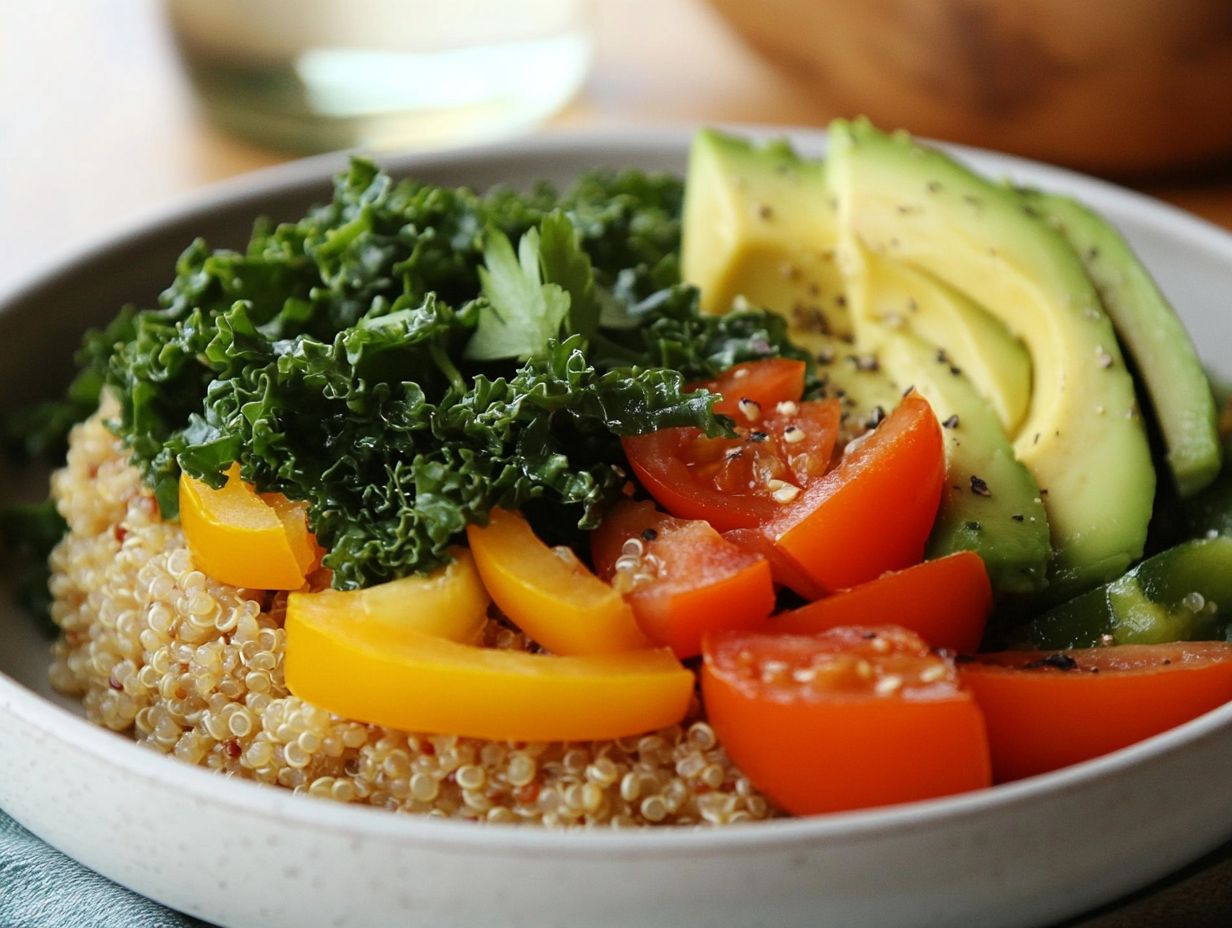
A vegan anti-inflammatory diet enhances immunity, enabling the body to respond effectively to inflammation triggers while also reducing the risk of infections. By ensuring the diet is rich in phytonutrients, antioxidants, and vitamins, immune function improves, ultimately leading to better health outcomes.
Incorporating specific dietary choices within a vegan anti-inflammatory framework can further boost immunity. For instance, foods high in vitamin C, such as citrus fruits, bell peppers, and leafy greens, have been shown to enhance immune response. Additionally, minerals like zinc and selenium, found in legumes and nuts, are crucial for regulating immune functions.
The gut microbiome significantly influences the immune system, and a diet rich in fiber from whole grains, fruits, and vegetables promotes a diverse and healthy gut microbiome, which is essential for optimal immune response.
Simple ways to incorporate these foods into your daily diet include:
- Starting the day with a smoothie made from spinach and berries
- Enjoying lentil soups
- Preparing colorful salads with a variety of seeds and nuts
This approach not only makes the diet enjoyable but also highlights the reciprocal relationship between nutrition and immune defense.
What Foods Are Included in a Vegan Anti-Inflammatory Diet?
A vegan anti-inflammatory diet consists of a diverse range of foods that promote health, reduce inflammation, and support a health-conscious lifestyle.
This type of diet is rich in fruits and vegetables, which provide essential vitamins and antioxidants, as well as whole grains and legumes, which are excellent sources of dietary fiber and plant proteins, contributing to a nutrient-dense eating pattern.
These foods are essential for creating a nutrient-dense eating pattern that supports the body’s response to inflammation and enhances the functionality of the gut microbiome.
1. Fruits and Vegetables
Fruits and vegetables are essential components of a vegan anti-inflammatory diet, as they are rich in antioxidants and phytonutrients that help combat oxidative stress and inflammation. These nutrient-dense foods not only provide essential vitamins but also offer numerous health benefits, such as supporting the immune system and reducing inflammation markers.
Among these, berries—particularly blueberries and strawberries—are especially effective due to their high levels of anthocyanins, which can help lower inflammation markers. Leafy greens like spinach and kale are also powerhouse ingredients, packed with vitamins A, C, and K, along with valuable anti-inflammatory compounds.
To incorporate these foods into your meals, consider starting your day with a smoothie made from spinach, banana, and berries, or enjoy a colorful salad featuring mixed greens, chopped apples, and walnuts for a crunchy, satisfying lunch.
For snacks, raw vegetables such as carrots and bell peppers can be paired with hummus, providing not only flavor but also a significant health boost.
2. Whole Grains
Whole grains are an essential component of a vegan anti-inflammatory diet, as they are rich in dietary fiber and vital nutrients that support digestive health and the body’s inflammatory response.
Incorporating whole grains such as quinoa, brown rice, and oats can help control blood sugar levels and reduce overall inflammation. These grains are also packed with antioxidants, vitamins, and minerals, making them ideal for enhancing overall health and improving blood flow.
For instance, barley and bulgur have impressive fiber content, which promotes feelings of fullness and aids in weight management, while farro offers a uniquely nutty flavor that can elevate various dishes.
Adding these whole grains to daily meals is simple; they can be included in salads, stews, or breakfast bowls. Additionally, many popular snack foods can be modified to feature whole grains instead of refined grain products.
For example, swapping refined crackers for whole grain options or brown rice cakes, or using whole grain flour in oatmeal cookies, can further enhance the anti-inflammatory benefits of a balanced vegan diet.
3. Nuts and Seeds
Nuts and seeds are excellent sources of healthy fats, particularly omega-3 fatty acids, which possess anti-inflammatory properties. Incorporating a variety of nuts and seeds into a vegan anti-inflammatory diet not only enhances flavor but also boosts nutrition and promotes heart health.
For instance, walnuts and flaxseeds are rich in omega-3s and can be easily integrated into daily meals. A handful of walnuts can add a delightful crunch to salads, while flaxseeds can be sprinkled into yogurt or blended into smoothies.
Almonds are another great option, as they are high in vitamin E and help reduce oxidative stress, a major contributor to chronic inflammation and inflammation response, making them an ideal snack when paired with fruits. Additionally, pumpkin seeds are packed with zinc and magnesium and can be roasted with spices to create a savory topping for soups or grain bowls, contributing to overall health benefits.
With a little creativity, these nutrient-dense foods, rich in antioxidants and phytonutrients, can enhance your meals while providing significant health benefits and supporting the immune system.
4. Plant-Based Proteins
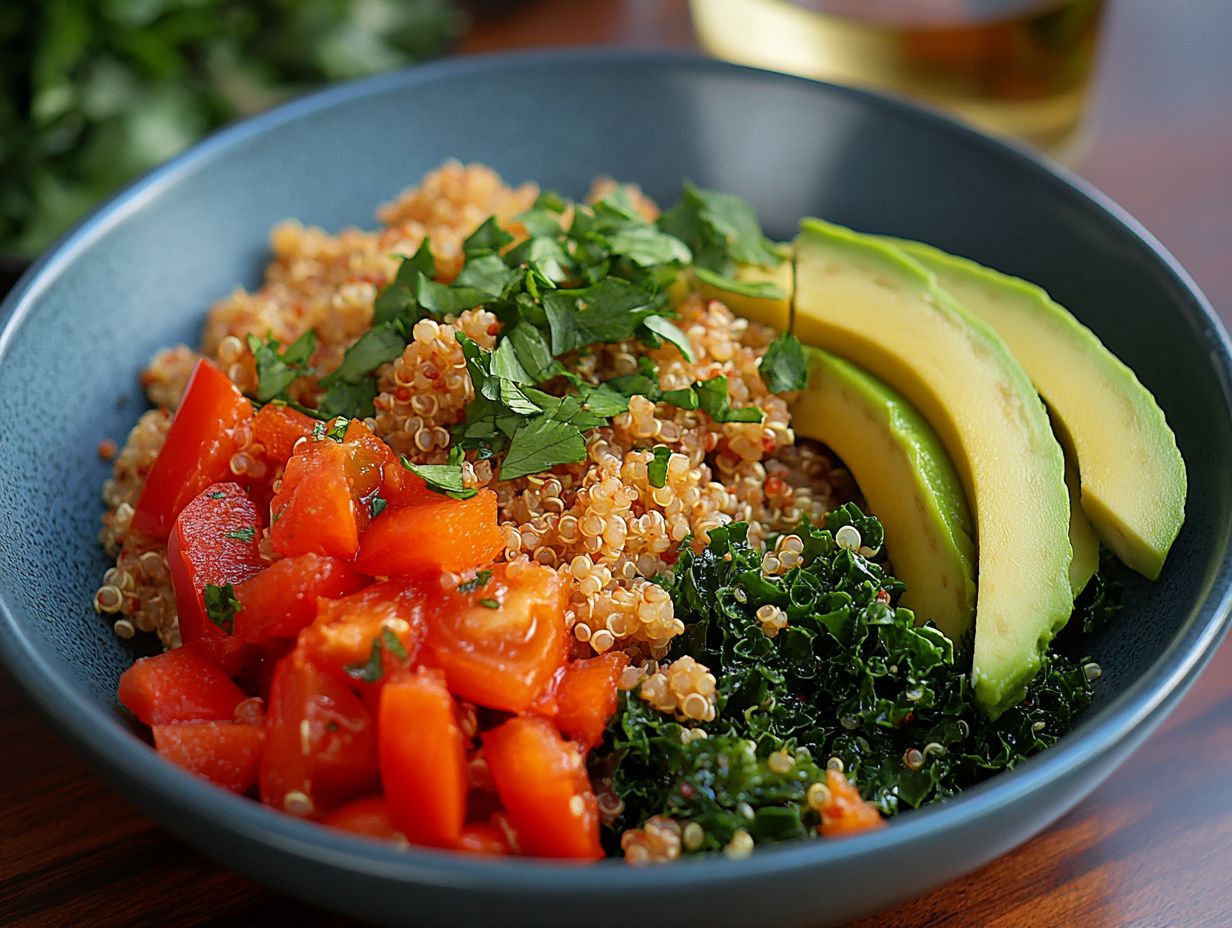
Plant-based proteins are essential components of a plant-based diet and vegan anti-inflammatory diet, offering vital nutrients without the inflammatory effects associated with many animal-based proteins. Legumes, such as beans and lentils, play a significant role in managing inflammation and promoting overall health. These legumes are high in dietary fiber, which supports digestive health, contributes to a healthy gut microbiome, and they have a low glycemic index, making them beneficial for stabilizing blood sugar levels and improving health outcomes.
Tofu and tempeh are additional excellent sources of plant-based proteins derived from soybeans, rich in essential amino acids and various micronutrients. Incorporating these proteins into daily meals is easy; for instance, one can add black beans to salads, prepare lentil soup, or stir-fry tofu with vegetables. Tempeh can serve as a meat substitute in various dishes.
By including these plant-based proteins, individuals can meet their protein requirements while fostering a balanced and healthy diet.
What Foods Should Be Avoided on a Vegan Anti-Inflammatory Diet?
A vegan anti-inflammatory diet is most effective when you avoid foods that trigger inflammation and undermine its health benefits.
Processed foods, refined sugars, and unhealthy fats, such as saturated and trans fats, all contribute to increased inflammation and can exacerbate the body’s inflammatory processes and immune response, negatively impacting overall health and increasing inflammation markers.
1. Processed Foods
Processed foods contain high levels of additives, preservatives, and unhealthy fats, making them significant contributors to inflammation and potential inflammation triggers. This is detrimental to the health benefits of a vegan anti-inflammatory diet. These foods are known to exacerbate inflammation and increase the risk of chronic diseases, highlighting the importance of making informed dietary choices.
Examples include sugary treats, fast food, and pre-packaged microwave meals, which are typically high in refined sugars, artificial flavors, and trans fats. These artificial ingredients not only lack beneficial nutrients but also trigger a cascade of stress in the body that can lead to chronic inflammation and interfere with inflammation management.
In contrast, individuals seeking a healthier lifestyle should focus on consuming whole, unprocessed foods such as fruits, vegetables, nuts, and whole grains. Incorporating anti-inflammatory foods and spices, such as turmeric, ginger, and green leafy vegetables, can further enhance overall wellness.
2. Refined Sugars
In a vegan anti-inflammatory diet, it is important to avoid refined sugars, as they can cause spikes in blood sugar levels and trigger inflammation in the body. Plus providing empty calories, these sugars negatively impact immune function.
High consumption of refined sugars is associated with obesity, heart disease, and diabetes. Therefore, finding healthy sugar alternatives is a priority for individuals following vegan diets.
Natural sugar substitutes such as:
- maple syrup
- agave nectar
- stevia
can satisfy sweet cravings without the harmful health effects associated with refined sugars. Additionally, individuals can replace sugary snacks with fruits and use spices like cinnamon and vanilla to enhance flavor, helping them gradually reduce the amount of added sugar in their foods.
3. Saturated and Trans Fats
Saturated and trans fats can be detrimental to a vegan anti-inflammatory diet, as they are linked to systemic inflammation and an increased risk of cardiovascular disease. These unhealthy fats are commonly found in processed snacks, fried foods, and certain margarines.
They may also be present in baked goods, non-dairy creamers, and some plant-based meat substitutes, which makes it essential for individuals to read food labels carefully. The consumption of these fats can raise cholesterol levels and contribute to various inflammatory conditions that adversely affect health.
Therefore, it is crucial for those following a vegan lifestyle to seek healthier sources of fat. Including options such as avocados, nuts, seeds, and olive oil can provide essential nutrients while promoting an anti-inflammatory response, thereby supporting a balanced and healthy diet.
4. Dairy Products
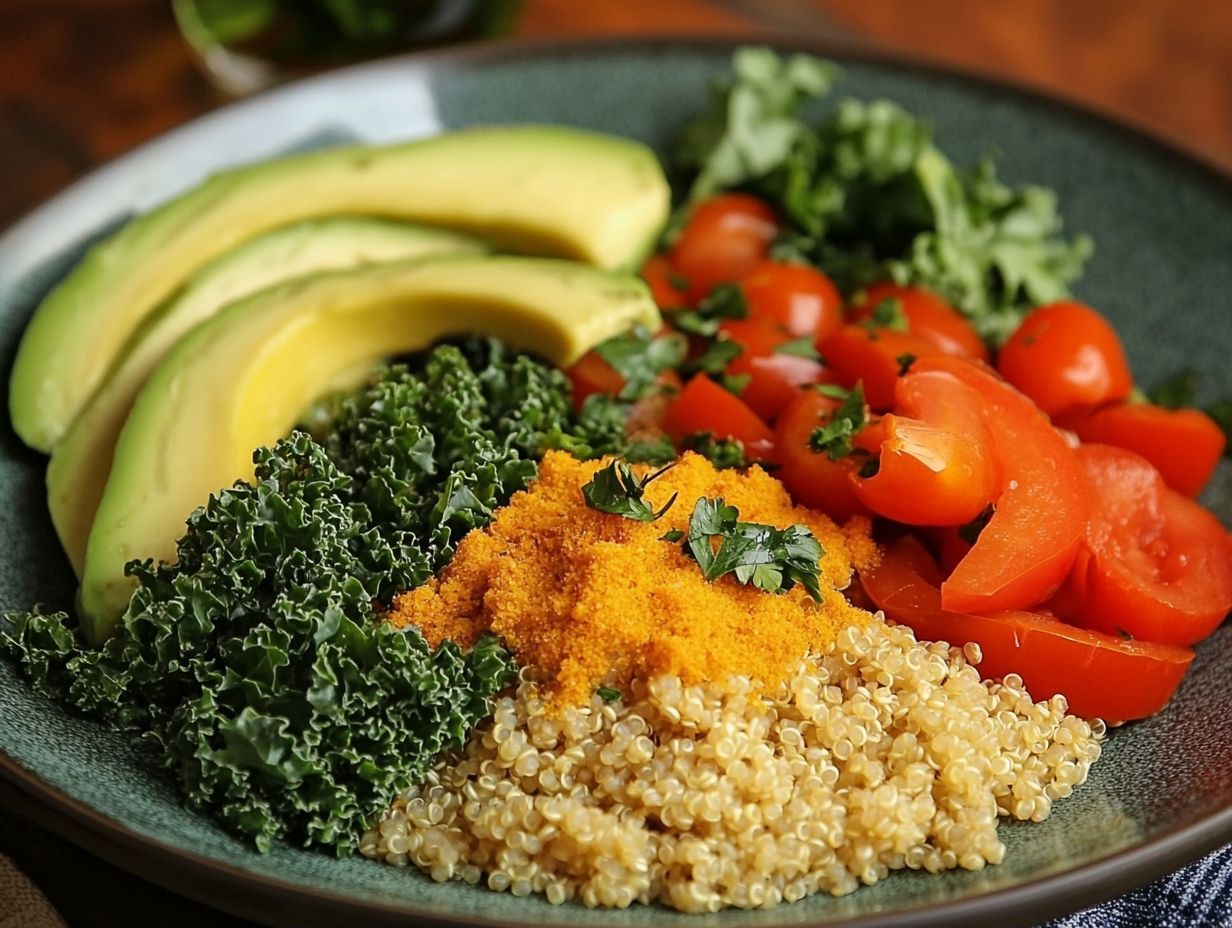
Dairy products are often excluded from a vegan anti-inflammatory diet because they can trigger inflammation in many individuals, particularly those with autoimmune diseases. Numerous studies have indicated that dairy consumption is linked to increased markers of inflammation, making it advisable to avoid dairy in such diets.
This reaction is likely due to certain proteins and sugars found in dairy products, which can provoke immune responses in some people, leading to symptoms such as bloating and discomfort. Additionally, the saturated fats present in full-fat dairy may further contribute to inflammation in the body.
The good news is that there are many alternatives available, such as almond, soy, or oat milk, which offer a creamy texture without the negative effects associated with dairy.
To meet calcium and vitamin D requirements, individuals can consider:
- Fortified plant-based milk options
- Legumes
- Nuts
- Even supplements
All while adhering to a lower inflammatory diet.
How Can a Vegan Anti-Inflammatory Diet Be Incorporated into Daily Life?
A vegan anti-inflammatory diet can be integrated into daily life through thoughtful meal planning and dietary choices that promote health and incorporate anti-inflammatory foods along with healthy fats.
Well-balanced meals not only provide essential nutrients and calories but also help to limit inflammation.
1. Meal Planning and Preparation
Meal planning and preparation are crucial for a vegan anti-inflammatory diet as they promote healthier eating choices and establish consistent dietary habits. By ensuring that nutrient-rich foods that reduce inflammation are readily available and easy to consume, meal planning sets the foundation for a successful diet.
This process begins with individuals deciding in advance what meals and snacks they will eat throughout the week. A healthy meal plan should be balanced and diverse, allowing individuals to tailor it to their preferences and requirements based on factors such as:
- Food allergies or intolerances
- Cultural or religious preferences
- Personal health conditions
- The availability of certain foods in their area
- Whether they are cooking for a family or group
An important aspect of meal planning is creating a shopping list for the week’s meals, which reduces the likelihood of impulse purchases and ensures that all necessary ingredients are on hand. Preparing meals in advance also facilitates adherence to the diet and supports a health-conscious lifestyle. Batch cooking, which involves preparing multiple portions of meals at the same time, is an effective way to save time during the week. This approach promotes portion control, essential for following dietary guidelines and maintaining a healthy weight.
Another helpful tool for meal prepping is the freezer, allowing individuals to prepare and freeze meals in advance for days when they cannot find time to cook. This system can assist in maintaining a healthy weight on a vegan anti-inflammatory diet; when portion sizes are pre-measured, individuals are less likely to overestimate appropriate serving sizes or be tempted to overeat. For many, having pre-prepared meals with healthy portions can help reduce cravings.
Incorporating seasonal produce is another effective strategy, as it adds variety and freshness to meals while often being more affordable. Including a diverse array of colorful fruits and vegetables, whole grains, legumes, and healthy fats will enhance the diet’s nutrient profile, contributing to overall health.
2. Eating Out Options
Dining out while adhering to a vegan anti-inflammatory diet is achievable through careful selection of healthy and nutritionally balanced meals. The increasing availability of plant-based options that align with anti-inflammatory diets allows us to enjoy dining out without compromising our dietary preferences.
To successfully navigate restaurant menus, it is essential to closely examine the ingredient lists for meals that feature anti-inflammatory components, such as leafy greens, berries, nuts, and seeds. Don’t hesitate to ask servers if a dish can be modified by substituting dairy with nut-based alternatives or removing other ingredients that may trigger inflammation.
Restaurants that offer Mediterranean or Asian cuisines are particularly promising, as they often provide a variety of vegan options, such as hearty vegetable stews and tofu dishes, which align well with an anti-inflammatory diet.
3. Tips for Maintaining a Vegan Anti-Inflammatory Diet
Maintaining a vegan anti-inflammatory diet requires dedication and smart food choices to achieve dietary goals while effectively managing inflammation levels. Simple strategies, such as meal prepping, cooking large batches of food, and keeping a variety of healthy snacks on hand, can help individuals stay on track and manage inflammation symptoms.
Additionally, seeking support from online communities or local meetups can provide motivation and a shared space for exchanging experiences.
On days when cravings for less healthy foods arise, having healthy alternatives like fruits, nuts, or homemade energy bars readily available can satisfy those cravings without derailing the diet.
Prioritizing consistency in dietary choices and adhering to a plant-based diet rather than striving for perfection allows for occasional indulgences while still working toward long-term health outcomes.
Creating a daily meal plan that includes a diverse range of meals and snacks with nutrient-dense foods, such as whole grains, vegetables, and fruits, can also enhance the enjoyment and ease of following the diet, positively impacting inflammation levels.
Are There Any Risks or Side Effects to a Vegan Anti-Inflammatory Diet?
A vegan anti-inflammatory diet is generally safe and offers numerous health benefits, such as reducing inflammation markers and improving cardiovascular health; however, there are potential risks and side effects that individuals should be aware of, particularly concerning their nutritional needs. Without careful planning, this diet can lead to deficiencies in essential nutrients such as vitamin B12, iron, and omega-3 fatty acids, primarily due to the exclusion of animal products, which are key sources of these nutrients.
For instance, a deficiency in vitamin B12 can result in lethargy and neurological issues, while iron deficiency may lead to anemia. To mitigate these risks, and to support a healthy immune system, individuals can consider incorporating fortified foods or supplements into their diet, focusing on nutrient sources that combat oxidative stress and support tissue healing.
For omega-3 fatty acids, adding plant-based sources like flaxseeds, chia seeds, and walnuts can help ensure adequate intake. Maintaining a balanced diet that includes a wide variety of fruits, vegetables, whole grains, and legumes is crucial for meeting all nutritional needs, reducing inflammation triggers, and supporting overall health through anti-inflammatory properties.
Consulting with a Healthcare Professional Before Starting a Vegan Anti-Inflammatory Diet
Consulting a healthcare professional before adopting a vegan anti-inflammatory diet is essential for individuals who wish to make significant dietary changes, as it ensures that all nutritional requirements are met, and helps manage chronic inflammation and inflammation symptoms effectively.
A registered dietitian or nutritionist can offer personalized dietary advice, helping to prevent and overcome obstacles while enhancing the likelihood of positive outcomes. This guidance is crucial for identifying specific nutrient needs that may vary based on individual health conditions, lifestyle factors, or activity levels, and can guide the inclusion of healthy fats and plant proteins to support inflammation management.
They can assist in formulating nutritional meal plans that emphasize whole plant foods while still providing adequate protein, vitamin B12, omega-3 fatty acids, and iron. Additionally, a healthcare professional can monitor any changes in health status during the transition, adjusting the diet as necessary and addressing any concerns related to chronic diseases or autoimmune conditions, thereby making the shift to a vegan anti-inflammatory diet smoother and more successful.

